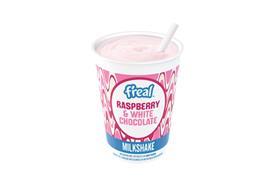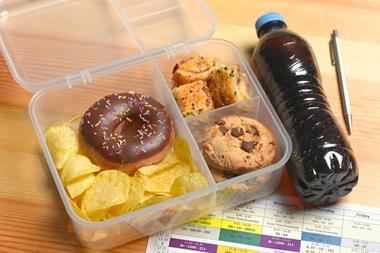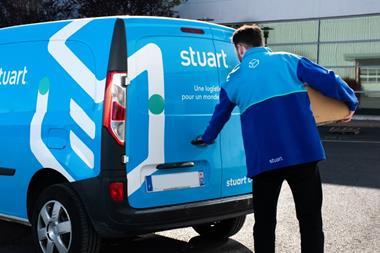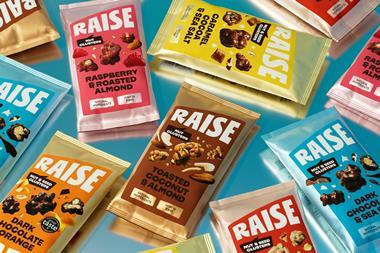From a nutritionist's point of view breakfast might be the most important meal of the day, but in reality it seems that people are leaving little time to sit down and eat it.
According to latest research from HIM, consumers are either skipping breakfast completely, or are grabbing a coffee and a bite to eat on the way to work. HIM says that one in five people in the UK leaves the house without breakfast, mainly because they haven't time (39%). However 3% get breakfast on the way to work. So where are they buying it?
Well, according to HIM, today's shoppers don't seem as fixated with health and wellbeing as we might have thought when it comes to breakfast, with 29% of the people interviewed for its High Street Tracking programme 2008 stopping off at McDonald's for their morning meal. Prêt à Manger, Greggs and the local coffee shop are also popular pick-up points for breakfast fayre.
The good news is that 11% of these consumers buy their breakfast from their local independent retailer and 35% say they would consider buying breakfast from a convenience store - but what puts them off is not knowing what the store has on offer.
What they want primarily is something quick and convenient, says the research. In fact, HIM reports that 40% of people in food-for-now outlets are there for breakfast. Does this mean, then, that convenience stores need to start making space for hot bacon baps and coffee? Not necessarily, says Susy Ford, category strategy manager at Unilever's Partners for Growth. "Hot is an option, but there is high wastage and it very much depends on your local area. If you are a shop with a lot of workers passing through then it will probably work. There are a lot of breakfast opportunities for independent retailers - but retailers need to really shout about their offering."
A lot of this is down to good
in-store marketing, says Ford. She recommends that shop owners open up their windows so shoppers can actually see what's in store. They should also look at zoning items by occasion to make it easier for shoppers to spot related products and encourage them to top-up. Ford also advises retailers to think about meal deals for occasions other than lunch. She also says it's a good idea to leave leaflets by the till so shoppers popping in for their paper are aware of what's available in other areas of the shop.
If you are looking at food to go, says Ford, you need to make sure you have a quality offering and know who the competition is. "Retailers need to understand that the competition isn't just the multiples - it's the coffee shop down the road as well. In the shopper's mind all they are thinking about is the fact that they must get some breakfast so you just need to make it as easy as possible for them."
Bakehouse, which produces ready-to-bake European pastries, puts a large proportion of its business through the convenience channel. The reason its range does so well, says marketing manager Kate Raison, is that it's a quality product that is baked fresh. "Bakehouse's latest sales data shows that consumers are after premium, indulgent products, whether for eating breakfast on the go or purchasing for a lazy breakfast at the weekend. The beauty of bake-off is that retailers can bake little and often to avoid wastage and keep the fixture looking fresh."
The best-selling breakfast products from Bakehouse's range include the all-butter croissant, pain aux raisins and pain au chocolat. Bakehouse recently launched a chocolate praline croissant that features a chocolate and hazelnut filling. Also new is its continental pastry selection, which includes its three best-selling viennoiserie products - 16 all-butter croissant, 10 pain au chocolat and 10 pain aux raisins in one case. These are supplied frozen for bake-off in just 18 minutes.
The popularity of bakery occasions for breakfast is also being reflected in the expanding range offered by the major bread manufacturers. Warburtons' Bakery Review for this year shows that value growth for continental-style breakfast goods is streets ahead of more traditional breakfast products. For example, brioche is up in value terms by 15% year on year and pain au chocolat is up 9%. In the more traditional breakfast categories, crumpets are leading the field with year-on-year growth of 8.6% and annual sales of more than £63m.
Warburtons category director Sarah Miskell says that overall the breakfast bakery occasions sector is showing strong year-on-year growth with value up 18.2%. The company has just relaunched its traditional breakfast bakery occasions product range with crumpets, pancakes and potato cakes.
Toast is still a major feature at breakfast time, mainly because it's quick and easy to prepare, but what we are putting on it is starting to change. Jam might be traditional for toast, but it is facing stiff competition from what are perceived as healthier savoury spreads such as Marmite and peanut butter. Jam and marmalade are also seeing major competition from other players in the sweet sector. Honey brand Rowse says it is now the top sweet spreads brand in the UK with a total grocery market retail sales value of £28.3m - more than Premier Foods' Hartley's Jam at £20.4m and Robertson's Marmalade at £13.5m.
"Rowse is also by far the leading brand in the convenience sector with a 45.4% brand share, against 27.7% for own label and 24.5% for Gales," says Rowse chairman Stuart Bailey. In fact, sales of the Rowse brand in the convenience sector increased in value by 31.8% in the past 12 months. Its top-selling SKU in the sector is Rowse Blossom 454g clear, which increased by 15.2% in the past year. This is followed by Rowse Blossom Squeezable 340g, up by 30% in 12 months. Bailey adds that the squeezable bottle format has been particularly successful in driving sales.
Rowse has decided to extend the brand into the dynamic chocolate spread market, which is growing at more than 21% year on year. Its Rowse Luxury Chocolate & Hazelnut with a hint of honey spread will be available to the convenience trade in the New Year, rrp £1.99.
Leading chocolate spread brand Nutella is, however, making sure that it's not going to lose its spot as the best-selling brand in this category easily. It has recently repositioned the brand as a breakfast product in the UK with a £5m advertising campaign and has been reaping the rewards with 38% growth this year. Levi Boorer, head of customer development at Ferrero, says that this was the first time Nutella had advertised on television and believes the move has been worth the investment. He adds that growth is good in the convenience channel, but there is more work to be done to make sure stores see Nutella as a key top-up item and not as a confectionery line.
Whether people crave a continental creation, or a toast-based treat for breakfast, it's vital that
c-stores make mornings a key sales period by clearly communicating their offerings to consumers. It seems this really is a case of the early bird catches the worm.
According to latest research from HIM, consumers are either skipping breakfast completely, or are grabbing a coffee and a bite to eat on the way to work. HIM says that one in five people in the UK leaves the house without breakfast, mainly because they haven't time (39%). However 3% get breakfast on the way to work. So where are they buying it?
Well, according to HIM, today's shoppers don't seem as fixated with health and wellbeing as we might have thought when it comes to breakfast, with 29% of the people interviewed for its High Street Tracking programme 2008 stopping off at McDonald's for their morning meal. Prêt à Manger, Greggs and the local coffee shop are also popular pick-up points for breakfast fayre.
The good news is that 11% of these consumers buy their breakfast from their local independent retailer and 35% say they would consider buying breakfast from a convenience store - but what puts them off is not knowing what the store has on offer.
What they want primarily is something quick and convenient, says the research. In fact, HIM reports that 40% of people in food-for-now outlets are there for breakfast. Does this mean, then, that convenience stores need to start making space for hot bacon baps and coffee? Not necessarily, says Susy Ford, category strategy manager at Unilever's Partners for Growth. "Hot is an option, but there is high wastage and it very much depends on your local area. If you are a shop with a lot of workers passing through then it will probably work. There are a lot of breakfast opportunities for independent retailers - but retailers need to really shout about their offering."
A lot of this is down to good
in-store marketing, says Ford. She recommends that shop owners open up their windows so shoppers can actually see what's in store. They should also look at zoning items by occasion to make it easier for shoppers to spot related products and encourage them to top-up. Ford also advises retailers to think about meal deals for occasions other than lunch. She also says it's a good idea to leave leaflets by the till so shoppers popping in for their paper are aware of what's available in other areas of the shop.
If you are looking at food to go, says Ford, you need to make sure you have a quality offering and know who the competition is. "Retailers need to understand that the competition isn't just the multiples - it's the coffee shop down the road as well. In the shopper's mind all they are thinking about is the fact that they must get some breakfast so you just need to make it as easy as possible for them."
Bakehouse, which produces ready-to-bake European pastries, puts a large proportion of its business through the convenience channel. The reason its range does so well, says marketing manager Kate Raison, is that it's a quality product that is baked fresh. "Bakehouse's latest sales data shows that consumers are after premium, indulgent products, whether for eating breakfast on the go or purchasing for a lazy breakfast at the weekend. The beauty of bake-off is that retailers can bake little and often to avoid wastage and keep the fixture looking fresh."
The best-selling breakfast products from Bakehouse's range include the all-butter croissant, pain aux raisins and pain au chocolat. Bakehouse recently launched a chocolate praline croissant that features a chocolate and hazelnut filling. Also new is its continental pastry selection, which includes its three best-selling viennoiserie products - 16 all-butter croissant, 10 pain au chocolat and 10 pain aux raisins in one case. These are supplied frozen for bake-off in just 18 minutes.
The popularity of bakery occasions for breakfast is also being reflected in the expanding range offered by the major bread manufacturers. Warburtons' Bakery Review for this year shows that value growth for continental-style breakfast goods is streets ahead of more traditional breakfast products. For example, brioche is up in value terms by 15% year on year and pain au chocolat is up 9%. In the more traditional breakfast categories, crumpets are leading the field with year-on-year growth of 8.6% and annual sales of more than £63m.
Warburtons category director Sarah Miskell says that overall the breakfast bakery occasions sector is showing strong year-on-year growth with value up 18.2%. The company has just relaunched its traditional breakfast bakery occasions product range with crumpets, pancakes and potato cakes.
Toast is still a major feature at breakfast time, mainly because it's quick and easy to prepare, but what we are putting on it is starting to change. Jam might be traditional for toast, but it is facing stiff competition from what are perceived as healthier savoury spreads such as Marmite and peanut butter. Jam and marmalade are also seeing major competition from other players in the sweet sector. Honey brand Rowse says it is now the top sweet spreads brand in the UK with a total grocery market retail sales value of £28.3m - more than Premier Foods' Hartley's Jam at £20.4m and Robertson's Marmalade at £13.5m.
"Rowse is also by far the leading brand in the convenience sector with a 45.4% brand share, against 27.7% for own label and 24.5% for Gales," says Rowse chairman Stuart Bailey. In fact, sales of the Rowse brand in the convenience sector increased in value by 31.8% in the past 12 months. Its top-selling SKU in the sector is Rowse Blossom 454g clear, which increased by 15.2% in the past year. This is followed by Rowse Blossom Squeezable 340g, up by 30% in 12 months. Bailey adds that the squeezable bottle format has been particularly successful in driving sales.
Rowse has decided to extend the brand into the dynamic chocolate spread market, which is growing at more than 21% year on year. Its Rowse Luxury Chocolate & Hazelnut with a hint of honey spread will be available to the convenience trade in the New Year, rrp £1.99.
Leading chocolate spread brand Nutella is, however, making sure that it's not going to lose its spot as the best-selling brand in this category easily. It has recently repositioned the brand as a breakfast product in the UK with a £5m advertising campaign and has been reaping the rewards with 38% growth this year. Levi Boorer, head of customer development at Ferrero, says that this was the first time Nutella had advertised on television and believes the move has been worth the investment. He adds that growth is good in the convenience channel, but there is more work to be done to make sure stores see Nutella as a key top-up item and not as a confectionery line.
Whether people crave a continental creation, or a toast-based treat for breakfast, it's vital that
c-stores make mornings a key sales period by clearly communicating their offerings to consumers. It seems this really is a case of the early bird catches the worm.
Best of British
Over the past couple of years there has been a growing interest in traditional British produce – and nothing is more traditional than the great British fry-up.
Wall’s says it has seen growth of 31% across its bacon range, with current sales at £21m – making it the number-one bacon brand in the market. It says the bacon market overall is now worth more than £805m and is in growth by 3.1%. Currently, 21.1 million British households purchase bacon (85% of the total British population) with the average household buying bacon 10 times a year with an annual spend of £25.
The sausage market is also likely to see further growth as stretched shoppers opt for cheaper cuts of meat. That does not mean, however, that they are ready to compromise on quality. Provenance is a big deal in the meat category, so much so that Wall’s has just spent £8m highlighting the fact its sausages are made “with the finest two cuts of pork for sausages”, which is the strapline featured in its latest ad campaign.
But it’s not just what’s in the pack that Wall’s has focused its attention on. The sausages now come in ‘butcher-style’ brown paper packaging with a woodcut design logo to help consumers differentiate between variants.
Wall’s holds an 8% share of the UK branded sausage market, while sister brand Richmond holds the number one brand spot with a 16% share. Richmond brand manager Belinda Lee says that Richmond has doubled its 2009 investment to maintain its position.
Over the past couple of years there has been a growing interest in traditional British produce – and nothing is more traditional than the great British fry-up.
Wall’s says it has seen growth of 31% across its bacon range, with current sales at £21m – making it the number-one bacon brand in the market. It says the bacon market overall is now worth more than £805m and is in growth by 3.1%. Currently, 21.1 million British households purchase bacon (85% of the total British population) with the average household buying bacon 10 times a year with an annual spend of £25.
The sausage market is also likely to see further growth as stretched shoppers opt for cheaper cuts of meat. That does not mean, however, that they are ready to compromise on quality. Provenance is a big deal in the meat category, so much so that Wall’s has just spent £8m highlighting the fact its sausages are made “with the finest two cuts of pork for sausages”, which is the strapline featured in its latest ad campaign.
But it’s not just what’s in the pack that Wall’s has focused its attention on. The sausages now come in ‘butcher-style’ brown paper packaging with a woodcut design logo to help consumers differentiate between variants.
Wall’s holds an 8% share of the UK branded sausage market, while sister brand Richmond holds the number one brand spot with a 16% share. Richmond brand manager Belinda Lee says that Richmond has doubled its 2009 investment to maintain its position.
Better-for-you options
The health trend is still dominant in the category and although most cereals are sold through the multiples, there are staple brands that perform well in convenience and also act as beacon brands for your breakfast fixture. According to Weetabix, it is still the number one cereal brand in independents, with a 12.9% volume share and an 11.8% value share. Weetabix also says that a higher volume of children's cereals are sold in the independents than overall - the most likely reason being that families run out more frequently and need to top-up locally.
Now is the time to stock up on more seasonal cereals such as porridge, which due to the popularity of oats as a health ingredient has become a key category. But why should time-poor commuters on their way to work miss out on something hot and healthy to start the day? They may not have to with the launch of Grasshopper Porridge. This organic porridge comes in a recyclable pot and needs only hot water and a stir before it's ready to eat. It is currently available through 140 independents nationwide and Ocado (Waitrose's online delivery partner). Co-founder and director Abigail Emery says that Grasshopper Porridge has so far been well received. Pots retail at £1.99 each and the porridge currently comes in three flavours: coconut & date, cinnamon & raisin and chocolate.
The health trend is still dominant in the category and although most cereals are sold through the multiples, there are staple brands that perform well in convenience and also act as beacon brands for your breakfast fixture. According to Weetabix, it is still the number one cereal brand in independents, with a 12.9% volume share and an 11.8% value share. Weetabix also says that a higher volume of children's cereals are sold in the independents than overall - the most likely reason being that families run out more frequently and need to top-up locally.
Now is the time to stock up on more seasonal cereals such as porridge, which due to the popularity of oats as a health ingredient has become a key category. But why should time-poor commuters on their way to work miss out on something hot and healthy to start the day? They may not have to with the launch of Grasshopper Porridge. This organic porridge comes in a recyclable pot and needs only hot water and a stir before it's ready to eat. It is currently available through 140 independents nationwide and Ocado (Waitrose's online delivery partner). Co-founder and director Abigail Emery says that Grasshopper Porridge has so far been well received. Pots retail at £1.99 each and the porridge currently comes in three flavours: coconut & date, cinnamon & raisin and chocolate.

































No comments yet